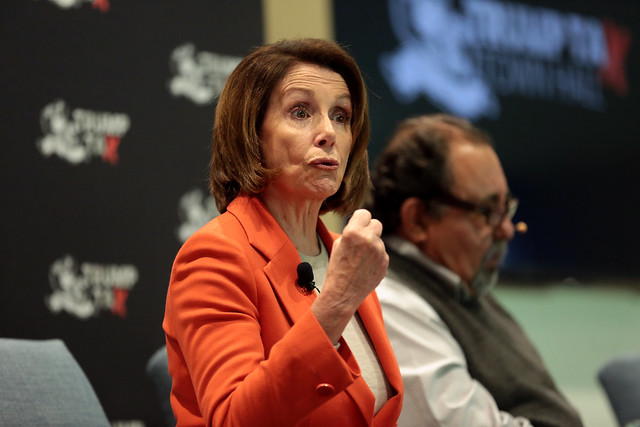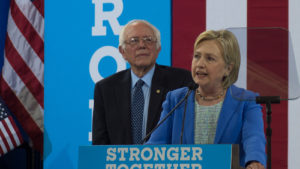Democrats Have Facilitated Trump’s Racist Attacks
By singling them out for criticism, Nancy Pelosi has all but invited the president to smear the progressive women of color in her caucus. Rep. Nancy Pelosi, D-Calif. (Gage Skidmore / Flickr)
Rep. Nancy Pelosi, D-Calif. (Gage Skidmore / Flickr)
What follows is a conversation between Gerald Horne, Kimberly Moffitt and Marc Steiner of The Real News Network. Read a transcript of their conversation below or watch the video at the bottom of the post.
SENATOR LINDSEY GRAHAM: We all know that AOC and this crowd are a bunch of communists. They hate Israel, they hate our own country, they’re calling the guards along our border— the Border Patrol agents— concentration camp guards, they accuse people who support Israel of doing it for the Benjamins, they’re anti-Semitic, they’re anti-America. Don’t get down, aim higher. We don’t need to know anything about them, personally. Talk about their policy.
MARC STEINER: Welcome everybody. It’s The Real News Network. I’m Marc Steiner. Senator Lindsey Graham speaks for Trump. They are like a tag team match. When Trump tweets telling people to go back to their own countries, and then tweets all of what Graham had said on Fox News to the 62 million people who follow him on Twitter, calling four new congressional representatives who are all women of color “communists,” what does this really hold for us? What does it portend for us and the policies to come? The political struggle that lies ahead of our country, how will it define it? How has this intensified what lays ahead of us?
We’re joined today by Dr. Kimberly Moffitt, Professor and Chairman of Language, Literacy & Culture at the University of Maryland-Baltimore County. She’s a media critic who often writes on politics and pop culture. She is co-editor of The Obama Effect in 2010 and the forthcoming volume, The FLOTUS Effect: Reflections on the Platform, Presence, and Agency of Michelle Obama. And once again, here on The Real News, Dr. Gerald Horne, the John J. And Rebecca Moores Chair of History and African American Studies at the University of Houston. He’s author of numerous books. Most recently, Storming the Heavens and The Apocalypse of Settler Colonialism. And folks, welcome. Good to have you with us.
Gerald, let me start with you, if I might. What we’ve seen over the last few days, we’ve seen— and I’ll talk a bit about later— episodes of this from presidents and presidential candidates over the years, kind of, really throwing out racist tropes. But this is taking it up a notch in terms of telling people to go back to their country, and more. So talk a bit about your analysis of what we’re seeing here now. And then we’ll hear what both of you think this, kind of, portends for what’s politically coming up next.
DR. GERALD HORNE: I think that undercurrents in the United States and of US history are bubbling to the surface. Perhaps, because of the crisis the United States faces externally with this ongoing trade war and new Cold War with China, and this ratcheting up attentions with Iran. What I mean is, is that if you look at US history, you will quickly note that before The US Civil War, there were basically three factions. There was a pro-slavery faction in Dixie. There was a white man’s country faction that said that black people should not be part of the United States of America and the only people who should be part of the United States of America are those defined as white. If you look at the history of Oregon, for example, which comes into the Union right before the Civil War, they basically barred the admission of black people in particular well into the 20th century, which is one of the reasons why Portland even today has one of the smallest black populations in the United States of America. Now, the historians mostly focus on the third faction, the abolitionist faction— John Brown, Frederick Douglass of Baltimore, William Garrison of New England, etc. But that’s a misreading of history and I think what’s happening now is that Mr. Trump is bringing to the surface this white man’s country faction, which encompasses— I’m afraid to say— a goodly number of his 63 million-strong base that voted for him in 2016, and are probably going to vote for him again in November 2020.
MARC STEINER: Kimberly, what’s your take? I mean, building on what Gerald Horne has just said, given that when you look at all these polls we have in America— it’s really interesting the findings in these polls, I was reading earlier this morning— that really kind of show how maybe 60% of Democrats think that we have a struggled to overcome racism, but only 15% of Republicans, which says to me that there’s if not a majority, then a significant portion of white Americans are saying they can go along with Trump. You can even say that it fills what their juices are about, what they’re seeing and hearing. How do you see this playing out?
DR. KIMBERLY MOFFITT: Yeah. And I also think it’s even a denial about the role of race in our society as a whole. That we don’t even believe this is something that we should be focused on because of what Trump is contributing to us, and what many believe is a very strong economy, and a willingness to say the things that haven’t been said by previous administrations regarding our borders, and our trade deals, all that many had felt like had been a bad deal for America. I also see this very much as about a browning of America that really frightens a lot of that 63 million that support President Trump. A lot of folks are struggling with the idea that these very vocal voices, the progressives of our House, currently happen to be women, but they are also brown women. And that becomes offensive to a white male that says there is a place for all of us, and they aren’t maintaining the place that they’re supposed to in our society.
MARC STEINER: And then you have on top of that, you have Senator Graham, what he said this morning on Fox where he called the four representatives literally “communists.” And going back to the tropes of the early 50s and the 60s again, when anybody who opposed the Vietnam War, anybody who was fighting for black liberation, what happened in the 50s in HUAC, are attacked as communists, Gerald. And I think that this is—I mean, we’re setting up a political battle here. Let me put it this way: I think we’re setting up a political battle, but I’m not so sure the Democrats are prepared to win given how this is being fought. What do you think?
DR. GERALD HORNE: I’m glad you brought up the Democratic Party because in some ways the Democratic Party, at least some elements within the leadership, paved the way for the rise of one Donald J. Trump. I take it that your audience has been paying attention to The New York Times for the past few days, which has been running major-length articles about the anti-busing record of one Senator Joe Biden, a former vice president under Barack Obama. As a Senator from Delaware, he led a one-man crusade against busing. And as Reverend Jesse Jackson said at the time, the issue wasn’t the bus; the issue was us. That is to say, the issue was the fact that black kids were going to be sharing classroom space with kids defined as white.
And then, if you look at the origins of this controversy that has brought us to your cameras today, in many ways it starts with an interview that Speaker Nancy Pelosi did with New York Times columnist Maureen Dowd when she sharply rebuked, reprimanded and criticized Congresswoman Ocasio-Cortez in particular, a congresswoman who has been receiving a steady rain of death threats. And that opened up Congresswoman Ocasio-Cortez to be receiving even more death threats. She, of course, clapped back. Speaker Pelosi, rather than taking the high road, then upped the ante and opened the door for Donald J. Trump to enter into this debate. And so once again, you see leading Democrats paving the way for the rise of Donald J. Trump’s racism.
DR. KIMBERLY MOFFITT: Yeah.
MARC STEINER: So, Kimberly, picking up on what Gerald just said, I mean, you know—What Trump did here, on the one hand is he saw a divide happening inside the Democrats and was trying to drive a truck through that divide and really split it wider and deeper. He was also making a very calculated move to throw red meat to the people who would vote for him, who voted for him, and are worried about and hate immigrants coming in. We’ve seen all the latest studies showing that race plays a huge factor in the reasons that they vote for Trump. And so, I mean, this is to me a very critical and dangerous moment.
DR. KIMBERLY MOFFITT: Indeed, it is. And what I would say is that Trump knows how to capitalize off of those very moments, and has been successful in doing so. I mean, here’s the reality. You know, the comments that Trump made via his tweets yesterday clearly are saying to us that we don’t have a right to critique what happens with our government nor the president. But the reality is, we in fact do, and we should be able to criticize our government and the individual who is running the government. That’s the beauty of being an American, is having that latitude in which to do so. The problem is that criticism does not equate to hate for our country, but Trump’s tweets do equate to hate. That’s where it’s been, that’s where the line has been crossed, where he has assumed that it’s acceptable for him to call out women who are born and bred in this country— at least three of the four— and don’t have a right to speak back to what they see as problematic in the country. And the other reality is, just as Trump decided he felt like he needed to be the leader of this nation because he didn’t like the direction of the country, so too did those four women. They didn’t like the direction of the country and decided to do something about it. and that’s what we are supposed to do.
MARC STEINER: When Trump writes in his tweets, “….and viciously telling the people”— talking about these women— “telling the people of the United States, the greatest most powerful Nation on earth, how our government is to be run. Why don’t they go back and help fix the totally broken and crime infested places from which they came. Then come back and show us how.” Which is almost going back to his being one of the leaders of the birther movement against Obama. I mean, it’s this really feverish hatred of immigrants that is coming to play here. And I think that, you know, that it—Well, moving ahead with this, let me show you this, and let’s talk about this one tweet in response. It was Congresswoman Ayanna Pressley and what she had to say. Let’s take a look at this tweet: “THIS is what racism looks like. WE are what democracy looks like. And we’re not going anywhere. Except back to DC to fight for the families you marginalize and vilify everyday.”
And so, the fight is coming back, but the question is, and I’m really curious—Well, let’s take a look at one other piece. I really want to put this back-to-back because I think it’s important. Rashida Tlaib also tweeted in response, and I found her tweet very interesting as well. “I am fighting corruption in OUR country. I do it everyday when I hold your admin accountable as a U.S. Congresswoman. Detroit taught me how to fight for the communities you continue to degrade & attack. Keep talking, you’ll be out of the WH soon. #TickTock.” Well, let’s talk about the “TickTock” for a moment. I mean, so can the Democrats overcome this divide internally to ensure that the white nationalists who have, kind of, seized the executive branch since the last election are not in power, and what that would mean? There’s a big argument of how that should happen. We don’t have to do that today, but I’m just curious how you think that plays out. Gerald?
DR. GERALD HORNE: Well, I’m afraid to say that it’s unclear at this point. As you probably know, certain polls suggest that Mr. Trump is ahead in terms of prevailing in November 2020. Other polls suggest that he is not with regard to running against Vice President Biden, or Senator Sanders, or Senator Kamala Harris, or Senator Elizabeth Warren. But we know that as of 8:30 p.m. on the first Tuesday in November 2016, The New York Times had Hillary Clinton ahead. And then minutes later, ruled that she had lost. So it’s difficult to say what’s going to happen, but with regard to your earlier point, it’s quite curious— is it not— that Mr. Trump during his inauguration speech in January 2017 railed against the real and imagined flaws of the United States of America. It was carnage, he suggested. And yet, these four Congresswomen are not allowed to make criticisms of the United States. He’s saying implicitly what he has said explicitly. That is to say, they should not count as US citizens, and only those who look like him should count as US citizens.
DR. KIMBERLY MOFFITT: I would concur with what my colleague has already said, but I would also suggest that where we currently are, the Democratic Party is really struggling to overcome this divide. And I think Trump, based on what Pelosi put out recently in response to the four Congresswomen, showed that there was a divide and it left a wide space open for him to enter and continue to broaden that particular bridge that exists right now, or the bridge that doesn’t exist right now. And I don’t see on the immediate horizon that the Democratic Party is doing what it needs to do to be able to bridge that, and be successful in overcoming Trump in the next election.
MARC STEINER: Let’s look at another clip here from Senator Graham again from the same Fox interview, and what he had to say. It’s important to talk about this, I think.
SENATOR LINDSEY GRAHAM: They wanted to impeach Trump on day one. They are socialist, they’re anti-Semitic, they stand for all the things that most Americans disagree with. Make them the face of the future of the Democratic Party. You will destroy the Democratic Party.
MARC STEINER: You can see from these clips, in terms of what the strategies are going to be here, and what they’re going to attempt to do, and this brush that they’re painting people with, and the clear terror in their hearts. I think in many ways because of these women of color who are standing up. And if you add to that, I found a really interesting quote I thought in The New York Times from Douglas Blackmon who wrote Slavery by Another Name, the great Pulitzer Prize-winning book. He said, “In many ways, this is the most insidious kind of racial demagoguery.” He writes that the president has moved beyond invoking serious slanders like neighborhoods and gone back to the rhetoric of the early 1900s of white supremacy. Again, given the state of America, I mean, watching this happen, it really gives me a moment of pause and gives me some chills about where we could be headed. I’ve done other programs here—And Gerald just talking about 1877, what 1877 means for us now in 2019. As does 1932, what it means for us now. So, I mean, this is not something to be taken lightly, I think.
DR. GERALD HORNE: Well, I think you’re right. And the only friendly amendment that I would make to what Douglas Blackmon said is that it soars far beyond the early 1900s in the era of white supremacy. It actually soars back to the antebellum period, the pre-1861 period, when a dominant, predominant faction amongst certain so-called white Americans was that this was a country for whites only. And recall that Abraham Lincoln himself early on in his administration was in favor of emancipation, then expulsion. Even in the last stages of his administration before he was assassinated, he was negotiating with various countries to dispatch and expel the black American population to their shores. So only those who have a romanticized gauzy view of settler colonialism in United States of America should be shocked and surprised that in 2019, these ideas, these noxious ideas of Donald J. Trump, bubble to the surface once again.
MARC STEINER: And so, Kimberly, as we kind of close this out, one of the things here as I was thinking about what Gerald just said and the place we find ourselves in, another thing from that same period of the Antebellum South when Abraham Lincoln won as President of the United States. In part, he won in this four-way race that he had, in part won because abolitionists and others allied with people who we would consider a moderate and didn’t necessarily want to fight slavery that way, to put him over the top even in that election. So I mean, there are a lot of lessons about history about what this says about the 21st century, and what people need to learn about what could happen if people do not, kind of, politically figure out what direction to go in.
DR. KIMBERLY MOFFITT: Indeed. And as someone who studies more contemporary media starting of course in the 50s, you know, so much of the rhetoric of Republicans seems to tie us right back to the 50s, right? In terms of what they feel like was the golden years in which the country was thriving for at least some, but certainly those that didn’t look like me, and it worked for them. And that becomes a particular decade that gets referenced and looked upon time and time again when we’re having conversations around “making America great.” And so, Trump is certainly implicitly taking us back to those moments to say this is where we were successful, and this is where we should be to continue being that great nation that we’ve always seen ourselves in. But again, all we see happening at the same time, instead of focusing on those policies and that legislation and those acts that would make a country successful, we see him stoking the flames of fear by talking continuously about issues of race and those individuals who are bringing harm, or at least raising questions about us being successful as a nation, and taking something away from the rest of us who are the legitimate Americans.
MARC STEINER: So I think that, as we close this out, this is the time when we all have to, kind of, hope and work for coalitions that actually confront this and allow a new America to be built and not to send us backwards.
DR. KIMBERLY MOFFITT: Indeed.
MARC STEINER: And so, I’m going to try to remain optimistic and push ahead. [laughs] Gerald Horne, it’s always great to have you with us. Kimberly Moffitt, thank you both so much for being here with us today. I look forward to continuing this discussion in greater depth. It’s always great to talk to the two of you. Thank you.
DR. GERALD HORNE: Bye-bye.
MARC STEINER: And I’m Marc Steiner here for The Real News Network. I want to thank you all for joining us. We’ll continue these conversations, obviously. Take care.
Your support matters…
Independent journalism is under threat and overshadowed by heavily funded mainstream media.
You can help level the playing field. Become a member.
Your tax-deductible contribution keeps us digging beneath the headlines to give you thought-provoking, investigative reporting and analysis that unearths what's really happening- without compromise.
Give today to support our courageous, independent journalists.






You need to be a supporter to comment.
There are currently no responses to this article.
Be the first to respond.